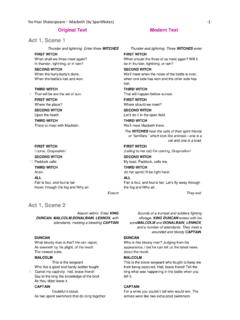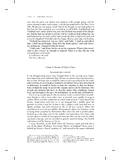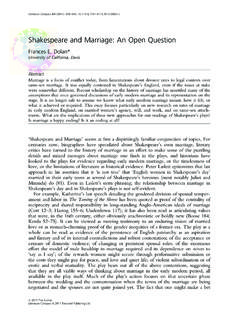Transcription of Freshman English with Mr. Price Shakespeare Packet
1 Name: _____ Period: _____ Freshman English with Mr. Price Shakespeare Packet 2 Shakespeare in the Classroom viewing guide While viewing the Shakespeare in the Classroom video, answer the following questions. 1. Complete the following: Why Shakespeare ? Because Shakespeare understood exactly what makes people wrote the most powerful portrayals on _____ relationships ever written. 2. When was Shakespeare Christened? 3. Whom did Shakespeare marry? 4. How many children did Shakespeare have? 5. In what year did his name first appear in print? 6. When did Shakespeare die? 7. Why were London theaters closed from 1592-1594? 8. How much did groundlings pay to stand in front of the stage? 9. What type of lighting was used in theater? 10. What kind of sets were used? 11. What kind of costumes were used? 12. Who played all female roles? 13. Who was ruler of England during Shakespeare s lifetime?
2 3 Backgrounder 1: Would You Believe What They Did Back Then? You re walking down an Elizabethan street in London, England. It s 1594. You see some not-so-savory sights, smell some not-so-savory scents, and avoid a not-so-savory accident. The streets are full of trash and horse droppings: they work like open sewers. Remember, there are no sewer systems. All kinds of filth and human waste are running through the streets, down to the Thames River. Watch your step and stay close to the wall! If you stick close to the wall, you won t dirty your shoes as much, and you won t get waste dropped on your head from a window above. If you happen to be rich and of the nobility, you have the right to walk closest to the wall. Unfortunately, you re a poor servant or working class, like a good deal of the English population of the time.
3 You have to step aside and give up the wall when a superior person passes. Glossary: savory: pleasant You re lucky to have avoided a nasty encounter with refuse, but, uh-oh, there s trouble on the horizon. Just ahead of you are two guys coming your way. They re carrying bucklers, small, round shields sporting the insignia of their bosses. And what s worse, they re wearing livery (a uniform of the master they work for) of a family that is enemies with your master! Not good. Okay, now things are as bad as can be, because as they approach, you see they carry swords, which usually only gentlemen (superiors) wear! These guys are looking for trouble. The trouble these guys are looking for will probably happen at a place called Smithfield, also known as Ruffian s Hall, where men looking to duel meet. You don t want to tangle with these guys, so you duck into a doorway and make yourself inconspicuous.
4 They pass you. You breathe a sigh of relief. All this fear has made you hungry, so you head for the market, where you scout for some lunch. Too bad you don t have much money; looks like you ll have to settle for Poor-John, so named because it s quite a deal: the cheapest dried fish. You get the tail, the head, the whole fish, but it s so dry that it s hard as wood. You pay the fishwife at the stall and gnaw at your lunch, trying not to break a tooth. Uh-oh. Here come those guys again. They weren t headed to Ruffian s Hall after all; they must have come up another street to the market. Hey, now they re mocking you and your pitiful lunch. You pretend not to see them , they really are biting their thumb at you! That s beyond rude! That s a challenge! Biting your thumb at someone is like giving the fig.
5 If you give the fig, you move your thumb in and out between your index and middle finger. Just guess how that gesture could be interpreted as obscene and insulting. Or better yet, don t! So, though biting the thumb isn t quite the fig, it s still saying the same thing, and you do it like this: put your thumbnail just behind your top front teeth. Now flick your thumb toward the other person so that you make a cracking sound. You just bit your thumb at someone, Elizabethan style! Now go apologize before they draw! 4 Backgrounder 2: Girl Power and Arranged Marriage It s 1594 again, and you re a girl growing up in Elizabethan England, about Juliet s age of 13. It doesn t matter how old you ll get: you ll never be guaranteed a chance to go to school, to get a job, to vote, or to have many, if any, legal rights. But the leader of England, one of the wealthiest, most successful countries in the modern European world, is female: Queen Elizabeth I!
6 How can a woman rule the nation while all other women have next to no rights? In Romeo & Juliet, Lord Capulet seems to be a modern Renaissance father, perhaps even on the cutting edge of women s rights, in his desire for Juliet to be in love with the man she marries. He tells Count Paris he must win Juliet s heart and that she is too young to marry just yet. Yet the old-fashioned social rules of the time regarding arranged marriage are quickly enforced once Lord Capulet has a change of heart and gives his word to Paris that the nobleman shall indeed wed Juliet, because I think she will be rul d / In all respects by me; nay, more, I doubt it not ( ) So just what were the rules of the day on arranged marriage? Arranging the Marriage Not all marriages during the Elizabethan era were arranged. Arranged marriage was much more common among the upper classes, though the medieval church reminded parents to consider their children s wishes when it came to such unions.
7 Christian doctrine viewed the purpose of marriage as threefold: comfort and support for husband and wife, procreation, and regulation of sexual activity. Among prosperous families like the Montagues and the Capulets, marriage was perceived as a means of gaining wealth, land, allies, and power. The joining through marriage of two noble families was considered smart both financially and politically. Often, arranged marriages were determined when the children were quite young.\ Fathers or male relatives of girls of the nobility selected the husbands. England, there was no legal marrying age, but the typical age began at about fourteen. Because life expectancy was shorter, women began having children at a younger age during this era. However, men of lower socioeconomic status were discouraged from marriage by apprenticeships that sometimes lasted seven years.
8 In an overpopulated nation, many couples waited into their twenties to marry, and by that time, often the bride was pregnant. It was no shame to be a pregnant bride, since Elizabethans considered an engagement, or betrothal, to be as good as marriage. However, it was a great shame to be pregnant and remain unmarried. Then the woman was in danger of being dishonored, and her child would be considered a bastard, a shameful state of affairs. 5 Dowry and Economic Protection for the Wife The dowry, or marriage portion, consisted of the money, riches, and property the woman brought into the marriage. The precontract, or betrothal, protected the woman by containing a clause laying out the dower rights. This was an agreed upon amount for the wife s living expenses in the event that she was widowed.
9 Yet this money was given to the widow only if she did not remarry or failed to return to her father s house. Because of their inferior place in society, Elizabethan women could not inherit property or wealth, no matter where they fell in the birth order. Control of family wealth was passed to a son or the father s brother if necessary. Women lost all rights to their dowry once they were married. Even if a woman married beneath her ( to a man of a lower social status), his status improved and he now became her lord, as well as master of all her property and wealth. Following the Ceremony Marriage ceremonies required two witnesses. In more public ceremonies, the couple was sent off to bed by the wedding guests, and the marriage bed was blessed by the priest. Consummation of the marriage was an important act in making the union official.
10 This consummation was believed to be like God s coupling of the husband and wife s souls. Men were considered the superior and all-powerful member of the couple, in both intellect and virtue. Women were expected to defer to their husband s wishes because the marital union was in keeping with the concept of divine order: God rules the universe, the king rules the country, and a husband rules his family. A husband or wife could leave the marriage for only a few reasons: the partner was guilty of heresy or infidelity, the partner was seriously disfigured, the partner was legally still married to someone else, or the partner was guilty of wickedness or drunkenness. 6 Backgrounder 3: Masks, Masques, and Masquerades In act 1, Romeo and his friends attend a masquerade ball thrown by Juliet s father. To avoid detection, they wear masks.









